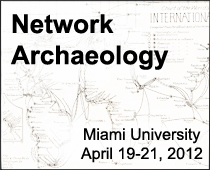Category Archives: Panel: Media Circuits, Network Affects

Postal Networks, Affect, and Going Astray: Aesthetic Solidarity
Presentation by Eileen Joy (Southern Illinois University Edwardsville). This paper will examine (or raise) the question of network affects, specifically in relation to (re)turns to outmoded communication technologies, such as the post-card and the mixtape, as seen especially in the

Postal Networks, Affect, and Going Astray: Aesthetic Solidarity
Presentation by Eileen Joy (Southern Illinois University Edwardsville). This paper will examine (or raise) the question of network affects, specifically in relation to (re)turns to outmoded communication technologies, such as the post-card and the mixtape, as seen especially in the
Print Networks: Questions of Access and Expertise in the Renaissance
Presentation by Cindy Klestinec (Miami University). The Renaissance is marked by several revolutions: political, scientific, and print. Indeed, the printing press allowed new circulatory models as well as new “trading zones” to emerge in the information economy of the period.
Print Networks: Questions of Access and Expertise in the Renaissance
Presentation by Cindy Klestinec (Miami University). The Renaissance is marked by several revolutions: political, scientific, and print. Indeed, the printing press allowed new circulatory models as well as new “trading zones” to emerge in the information economy of the period.
Elite Marriage Networks in Renaissance Italy: Mapping Kinship
Presentation by Renee Baernstein (Miami University). The paper analyzes patterns of aristocratic marriage alliance across regional states of Italy during the period of Spanish domination (1535-1600) to argue that cross-regional marriages helped build a shared Italian culture and language long
Elite Marriage Networks in Renaissance Italy: Mapping Kinship
Presentation by Renee Baernstein (Miami University). The paper analyzes patterns of aristocratic marriage alliance across regional states of Italy during the period of Spanish domination (1535-1600) to argue that cross-regional marriages helped build a shared Italian culture and language long


